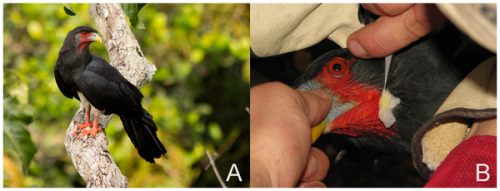Birds outsmart wasps to feed young

(Â鶹ÒùÔº) —A species of bird found in Central and South America is able to supply its young with a steady diet of wasp larvae, evading stings from defending workers by using physical, not chemical tactics as previously thought, Simon Fraser University biologists have found.
The team, led by SFU biological sciences student Sean McCann, spent months at a field station in South America observing the behaviour of the Red-Throated Caracaras, which preys on social wasps despite the wasps' often fierce defense of their nests. Their findings are published today in the journal PLOS ONE.
"Researchers had previously thought that the birds must produce powerful wasp-repellant chemicals that allow them to take nests without getting stung, but the hypothesis has never been tested," says McCann.
The researchers set out to observe the birds' activity at the Nouragues Field Station in French Guiana and placed cameras to record the action. Their surveillance revealed that smaller wasps did not defend their nests, choosing instead to abandon them, while larger wasps did fly out and attempt to sting the birds, driving them away, sometimes repeatedly.
But the birds would employ rapid 'fly-by' tactics to damage or knock down the nests, and eventually the larger wasps would flee.
The researchers also experimentally disturbed wasp nests and found that mechanical damage alone was sufficient to induce the wasps' absconding response.
McCann says unlike temperate-zone paper wasps that will never abandon their young because they only have one chance at reproduction, the adults of swarm-founding Neotropical wasps can cut their losses in the face of catastrophe, and start over with a new nest.
"Rather than chemical repellency, the behavioral tactics of the birds appear to rely on the wasps' ability to swarm and find new nests upon severe nest disturbance. They lose the brood in the nest, but retain the worker force," he says.
Red-Throated Caracaras are not only known for their spectacular attacks on fierce wasp nests, but also for their unusually well developed, cooperative breeding system.
More information: McCann S, Moeri O, Jones T, Scott C, Khaskin G, et al. (2013) Strike Fast, Strike Hard: The Red-Throated Caracara Exploits Absconding Behavior of Social Wasps during Nest Predation. PLoS ONE 8(12): e84114.
Journal information: PLoS ONE
Provided by Simon Fraser University

















